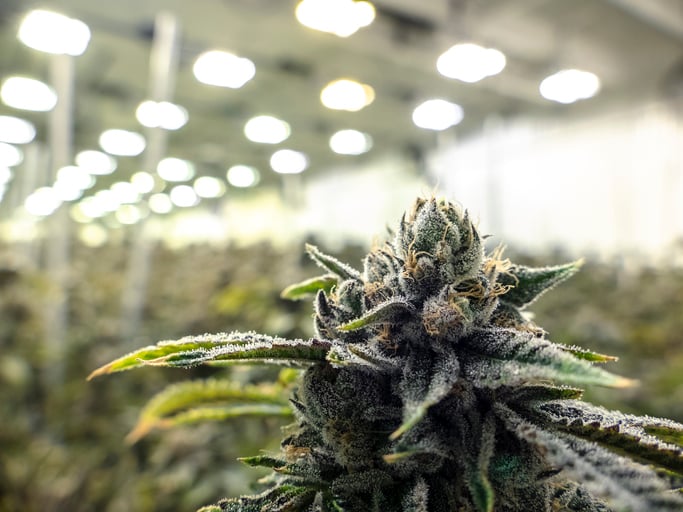The marijuana industry is thought of as one of the fastest-growing investment opportunities on the planet. Between 2014 and 2018, global sales of legal weed more than tripled from $3.4 billion to $10.9 billion, and the State of the Legal Cannabis Markets report from Arcview Market Research and BDS Analytics calls for a near-quadrupling from 2018 levels to $40.6 billion by 2024.
This is a growth rate typically reserved for game-changing technological breakthroughs, not a plant. Nevertheless, it's played a big role in pushing cannabis stock valuations into the stratosphere.

Image source: Getty Images.
Most Canadian pot stocks have lost at least half their value over the past year
On Oct. 15, 2018, just two days prior to Canada becoming the first industrialized country in the world to legalize recreational marijuana, pot stocks would close at their highest levels, as a whole. The Horizons Marijuana Life Sciences ETF, the first exchange-traded fund with a focus on cannabis, hit $18.71 in the U.S., representing a more than doubling from when it first debuted. Suffice it to say that the future looked bright.
But over the past year, marijuana stocks have come back to Earth in a big way. As of this past weekend, the Horizons Marijuana Life Sciences ETF, which contains roughly five dozen pot stocks of various weightings, had shed 58% of its value from its Oct. 15 closing high. Keep in mind that this return includes dividends paid. Certain individual performances were even worse, with the common theme being that Canadian marijuana stocks have been taken to the woodshed.
Just how bad have things been? Here's a rundown of the trailing performance of eight brand-name Canadian cannabis stocks since their closing price on Oct. 15:
- CannTrust Holdings (CTST +0.00%): Down 92%
- Tilray: Down 87%
- Aphria (APHA +0.00%): Down 69%
- Aurora Cannabis (ACB 2.13%): Down 68%
- Canopy Growth (CGC 3.36%): Down 66%
- HEXO (HEXO +0.00%): Down 63%
- OrganiGram Holdings: Down 50%
- Cronos Group: Down 33%
There's a not-so-technical term for this performance: Yuck!

Image source: Getty Images.
Here's why marijuana stocks have lost their buzz
While a bursting of the cannabis bubble was certainly expected at some point, given that no next-big-thing investment has been able to hold its hyperbolic gains over the past quarter of a century, the swiftness of the declines has probably caught pot stock investors off guard.
What's more, there isn't a single factor that can be pinpointed as the cause of this mess. Rather, it's a confluence of factors.
1. Health Canada has been slow to approve cultivation and sales licenses
To begin with, supply issues have been a persistent problem since Canada officially legalized adult-use weed on Oct. 17, 2018. One of the many reasons for this shortage is regulatory agency Health Canada's enormous backlog of cultivation and sales licenses. In many cases, it's taking months, or perhaps more than a year, to approve these applications, leading to long wait times for product to eventually find its way to market.
Aphria, for example, has been waiting more than a year to get the green light for production on its flagship Aphria Diamond joint venture that'll see 140,000 kilos produced annually.

Image source: Getty Images.
2. Individual provinces have delayed dispensary license approvals
The pot industry has also been stymied by the licensing approval process for physical dispensaries in select provinces. Without an expeditious rollout of physical retail stores, consumers have had few places to buy legal cannabis, other than online. And purchasing online simply doesn't work for impatient consumers.
Quebec-based HEXO, which bombed following its fourth-quarter operating update last week, specifically mentioned the slow rollout of physical dispensaries in its preliminary Q4 report as one of the reasons why it was revising its sales guidance significantly lower.
3. Growers were slow to expand capacity
Some of the blame can be cast on the growers, too. Canadian marijuana growers waited until the Cannabis Act was a lock to be signed into law before deploying big bucks to expand their cultivation capacity. This meant that many were nowhere near peak production by the time the green flag waved this past October.
Aurora Cannabis, Canada's leading producer with a forecast 625,000 kilos of run-rate output by June 2020, has just one of its four flagship projects (Aurora Sky) licensed and producing at the moment.

Image source: Getty Images.
4. Operating results have generally been awful
There's no denying that operating results for marijuana stocks have been terrible. With few exceptions (e.g., Aphria's most recent quarter), pot stocks have produced significant operating losses and haven't demonstrated to Wall Street that they're anywhere near recurring profitability. The problem is, profitability was expected in 2020 for most pot stocks at this time last year.
Canopy Growth, the largest cannabis stock in the world, lost more than 1.2 billion Canadian dollars last quarter, although a good chunk of this loss was tied to the extinguishment of warrants. Even backing all one-time benefits and costs out, Canopy's anemic gross margin of 15% led to a mere CA$13.2 million gross profit, which compares poorly to its CA$229.2 million in operating expenses.
5. Ongoing dilution has ravaged shareholders
Even though marijuana is now legal in Canada, access to basic banking services has still been spotty. Rather than turning to traditional forms of financing, most pot stocks have chosen to issue their own stock to raise capital or fund acquisitions. Unfortunately, the end result for shareholders has been share-based dilution.
Just ask the shareholders of Aurora Cannabis. Over the past five years, Aurora's outstanding share count has risen by 1 billion, which continues to place a lot of pressure on existing investors. Plus, these added shares could make it difficult for Aurora to produce a meaningful per-share profit in the future.

Image source: Getty Images.
6. Goodwill is building
Another powder keg for cannabis stocks is the growing amount of goodwill on their balance sheets. With acquisitions being a steady part of the growth strategy for most brand-name pot stocks, it's become evident that cannabis stocks likely overpaid for most, if not all, of their deals.
Aurora Cannabis and Canopy Growth are both lugging around CA$3.17 billion and CA$1.93 billion, respectively, in goodwill on their balance sheet. While some of this value might be recouped in the quarters and years to come, it's growing more likely that some of this goodwill could be written down in the not-so-distant future.
7. The launch of derivatives was delayed
Derivative pot products, such as edibles, infused beverages, vapes, topicals, and concentrates, are expected to be big moneymakers for the cannabis industry given their considerably higher margins, in comparison to dried cannabis flower. Unfortunately, the launch of derivatives, which was at one time expected by no later than October, won't first reach dispensaries until mid-December.
Once again, HEXO alluded to this derivative launch delay as another reason why its fourth-quarter sales growth was subpar, relative to its own previous forecast.

Image source: Getty Images.
8. Trust has become an issue
Lastly, investors are having trouble trusting cannabis stocks, and it's begun to take its toll.
No company has taken its shareholders through the wringer more decisively than Ontario-based CannTrust. In early July, CannTrust announced that it had been growing marijuana in five unlicensed rooms for a period of six months. Not long thereafter, it was uncovered that then-CEO Peter Aceto knew about this regulatory subversion and allowed it to continue, which is what ultimately led to his firing. Today, CannTrust has had its cultivation and sales licenses suspended until Health Canada believes the company has sufficiently complied with all cannabis regulations.
In short, while growth prospects for cannabis remain robust, growing pains are a natural part of that cycle.








